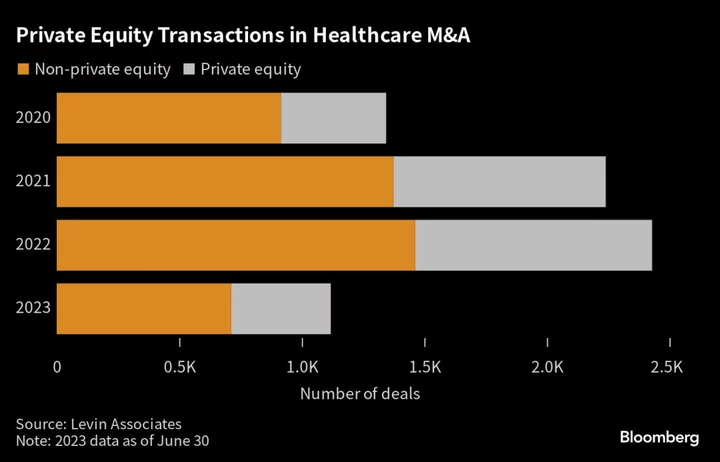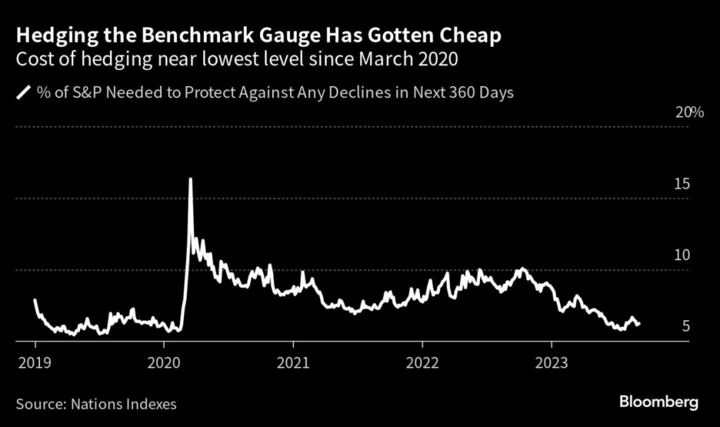Investors will continue to scoop up Treasuries despite Fitch Ratings’ move to cut the US’ credit rating although the downgrade may spur some short-term volatility, according to analysts.
Demand for US bonds is likely to remain strong as there are few markets that are large and safe enough to rank as an alternative, the analysts said. The dollar’s initial weakness is also not expected to last, they added.
Here’s what analysts and strategists had to say:
Amy Xie Patrick, head of income strategies at Pendal Group in Sydney
A credible alternative in terms of safe and large enough markets would be required if investors were to sell Treasuries, she said. “What would that be at the minute? Euro govvies? That’s still a currency breakup accident waiting to happen because of lack of fiscal unity. China? Nobody wants that sovereign risk. Japan? BOJ still owns half the market. It would take a lot for people to start taking these downgrades seriously and stop flying to quality with Treasuries. These sovereign downgrade events pertaining to high quality developed-market sovereign ratings are a bit like these debt ceiling debacles — can cause a bit of short term angst, but never amounts to anything much”
Galvin Chia, emerging market strategist at NatWest Markets in Singapore
“From an investment standpoint, I don’t think there’s a case to hold less Treasuries in the portfolio, ie as a result of higher political risk. In the broad scheme of things, things like the sanction of Russian financial markets after the Ukraine invasion and questions of de-dollarization (ie. reintroducing politics and political risk into finance) will be raising more questions about the role of US assets in financial markets, rather than the ratings per se”
James Wilson, senior portfolio manager at Jamieson Coote Bonds in Melbourne
“We do not believe the Fitch downgrade will have a huge market impact, as this brings the US into line with S&P ratings which were downgraded in 2011. The financial system has weathered much bigger storms since then, and the bigger factor towards higher yields is the glut of Treasury supply that is set to come through the market with the larger coupon announcement. 10-year USTs have popped up above 4% which has been a line in the sand for investors over the last year. I would expect this demand to continue.”
Alec Phillips, an economist at Goldman Sachs
“The downgrade mainly reflects governance and medium-term fiscal challenges, but does not reflect new fiscal information. The downgrade should have little direct impact on financial markets as it is unlikely there are major holders of Treasury securities who would be forced to sell based on the ratings change.”
Alvin Tan, head of Asia FX strategy at RBC Capital Markets in Singapore
“US Treasuries are the world’s largest and most liquid sovereign bond market. It’s unthinkable large global bond investors will decide to entirely exclude US Treasuries from their holdings. If they do, what USD-denominated bonds will they hold? Some investors may have to cut, especially the non-US domiciled funds. But I would not be surprised if many of them decided that they needed to change their mandates too in order to keep on holding US Treasuries”
Ho Woei Chen, an economist at United Overseas Bank in Singapore
“Investors are not likely to sell off Treasuries in droves due to the downgrade because they are still amongst the most liquid and safe assets. Diversification will continue but there’s unlikely to be a knee jerk reaction from the downgrade. Diversification happens for reasons including geopolitical tensions”
Impact on Dollar to be Muted
David Croy, interest rate strategist at Australia & New Zealand Banking Group in Wellington
“I suspect the market will be in two minds about it - at face value, it’s a black mark against the US’s reputation and standing, but equally, if it fuels market nervousness and a risk-off move, it could easily see safe haven buying of US Treasuries and the USD. It’s finely balanced.”
Laura Fitzsimmons, executive director of macro rates & FX sales at JPMorgan in Sydney
“The 2011 experience saw the flight to quality for USD and USTs in that environment, contrary to what would normally occur on a sovereign downgrade given the US’s key global position. Hence less of an obvious trade for FX players here, but we will watch to see if any more negative reaction in USTs which would provoke interest”
Carol Kong, a currency strategist at Commonwealth Bank of Australia in Sydney
“The USD may ease further in coming sessions if markets consider the rating cut will undermine the USD’s reserve currency status and markets sell their US Treasury bond holdings. But I don’t expect the USD will sustain any losses. Credit ratings are not typically a major medium term driver of currencies.”
Andrew Ticehurst, a rate strategist at Nomura in Sydney
“USD could underperform some of the majors, like EUR and JPY. Higher beta currencies across Asia should fare less well of course if this news leads to some broad risk-off price action. Ironically, if this headline causes some risk-off price action across asset classes, money will likely flow to defensive assets, and that includes highly liquid US Treasuries”
Viraj Patel, a macro strategist at Vanda Research in London
“Buy the dollar on dips if it sells off on the Fitch news, given that there isn’t that overhang of a near-term default. Key will be how equities react - whether this is something that knocks the Goldilocks rally. That’ll probably be the key for cross-asset markets and FX in particular”
Gareth Berry, currency and rates strategist at Macquarie Group in Singapore
“We’ve been here before and know that the financial system can cope. Still, US equities could experience some moderate selling pressure later today, which presents some downside risks for AUD/USD during the US session, although any surprise from ADP payrolls could overpower the reaction.”
--With assistance from Michael G. Wilson, Chester Yung, Wenjin Lv and Iris Ouyang.









